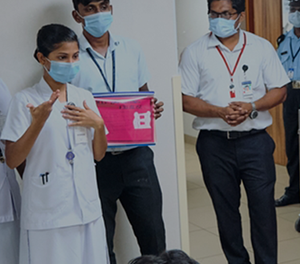OPD Services:
We have two units – Paediatric Surgery Unit 1 and Unit 2, and a specialised clinic of Paediatric Urology.
Our Outpatient Department(OPD) is located in the Area 520 in First floor, ISSCC building.
Clinic days are as follows:
Paediatric Surgery Unit 1
Tue, Thu (8 am to 1pm), Saturday (New appointments 10 am to 1 pm)
Paediatric Surgery Unit 2
Mon, Wed, Fri (8am to 1 pm)
Paediatric Urology
Monday to Friday (8 am to 1 pm) Saturday (New appointments 10 am to 1 pm)
Antenatal counselling is provided whenever an anomaly is detected in the ultrasound scan during pregnancy, in association with the Departments of Obstetrics and Neonatology.
Appointments can be booked in advance through the CMC Website online or on arrival to the hospital.
Go to the patient portal page: https://clin.cmcvellore.ac.in/webapt/telelanding.aspx
Go to the app on the Google playstore: https://play.google.com/store/apps/details?id=com.cmc.cmcmobile
Paediatric Surgery Emergency Service: This is housed in the general paediatric emergency department that treats all children with medical and surgical emergencies.
Clean Minor: This is attached to our OPD. Here we perform minor procedures like Herniotomy, circumcision, lymphnode biopsies etc. under sedation.
Urodynamics lab: This is also attached to our OPD. We perform a test called Cystometrogram (CMG) which is measures the urinary bladder volume and pressure in certain disease conditions like urinary incontinence or kidney and bladder dysfunction.
Operation Room: We have fully equipped operating rooms that are dedicated for elective and emergency paediatric surgery cases. We perform a wide range of open and advanced minimally invasive procedures (Laparoscopy / Key hole surgeries).
Common investigations
Ultrasound Test: This is a test to check for any mass, tumours, hydro-nephrosis etc. This is painless and harmless.
Barium Swallow: The child is given a medicine (contrast) to swallow and the doctor watches the passage of the medicine into the stomach and intestine on the x-ray. Problems such as Gastro-esophageal reflux and malrotation of the intestine are diagnosed by this test.
Barium enema: A special liquid (contrast) is placed into the rectum and xrays are taken. This is helpful in diagnosing problems like hirschsprungs disease, micro colon, meconium ileus etc.
Micturating cystourethrogram (MCU/ MCUG): A special liquid (contrast) is instilled into the urinary passage and as it fills the urinary bladder, several x-rays are taken. This is helpful in the cases of Vesico ureteric reflux, Ureterocoel, Urinary bladder diseases like Neurogenic bladder, Posterior Urethral valves, blockage / stricture in the urethra.
Nuclear renal scans (DTPA/ DMSA): These test assess the function of the kidneys and drainage of the urine into the bladder. Useful to detect any blockage between kidney and the bladder.
HIDA scan: This test is done in children with jaundice from birth. This is useful in understanding if the jaundice is due to blockage of bile from liver to the intestines. Sometimes, also done for gall bladder stones to look for the cause of the stone.

